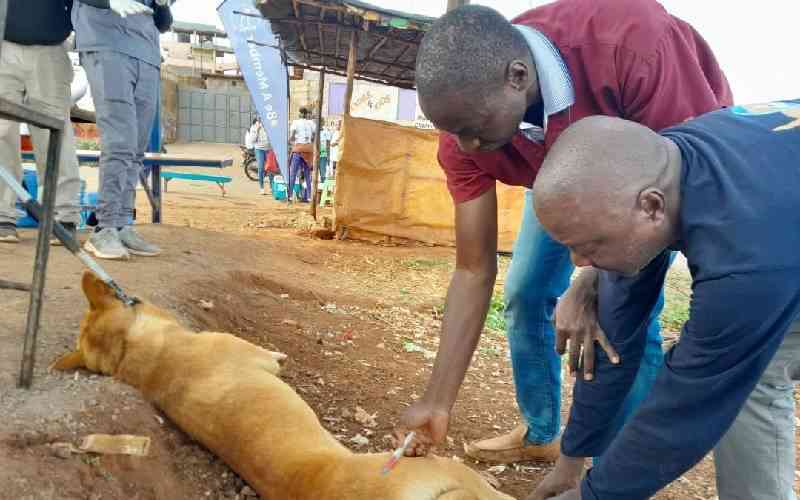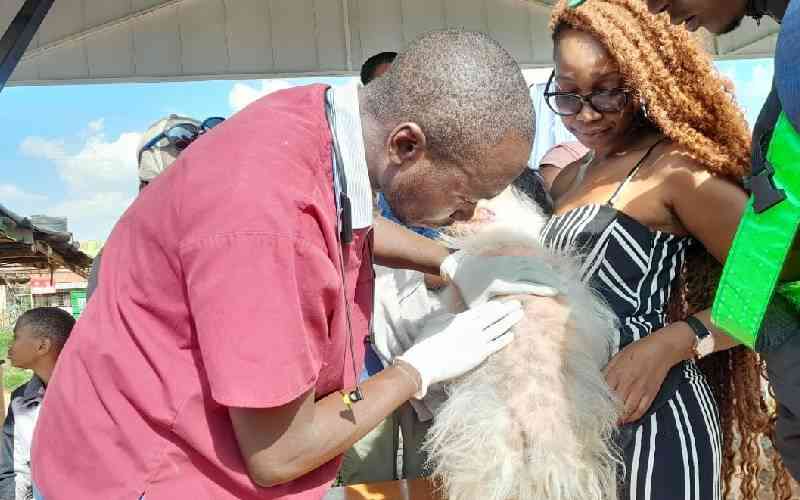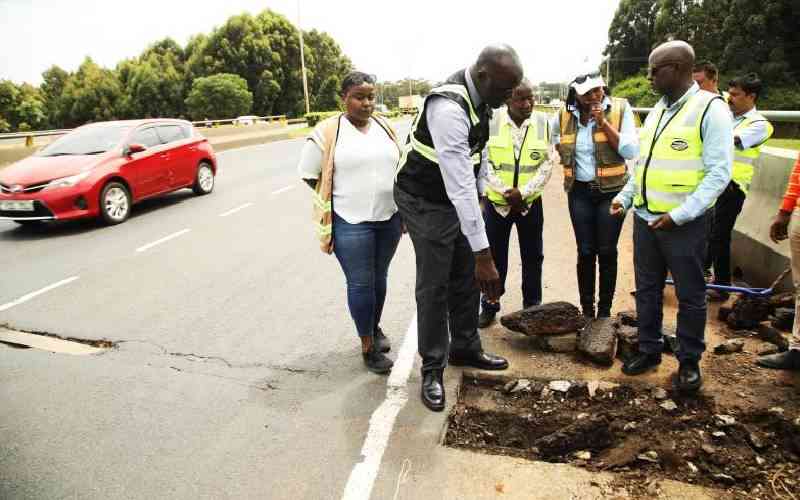
Pets like dogs and cats can be wonderful companions for people. However, these domestic animals can also present some health risks.
A dog or a cat that licks its owner may seem loving but can potentially pass on serious diseases, like rabies.
With rabies cases on the rise in many communities, experts warn that pet owners must be vigilant about vaccinating their animals and taking precautions to protect themselves and their families from this virus.
Rabies is a deadly viral disease that is typically transmitted from infected dogs to humans. While rabies has no cure, it is preventable through proper dog and cat vaccinations.
According to the World Health Organization (WHO), in up to 99 per cent of human rabies cases, dogs are responsible for virus transmission. Children between the ages of 5 and 14 years are frequent victims.
The global cost of rabies is estimated to be around US$ 8.6 billion (Sh1.1 trillion) per year, including lost lives and livelihoods, medical care and associated costs, as well as uncalculated psychological trauma.
"Globally there are an estimated 59,000 deaths from rabies annually; however, due to underreporting, documented case numbers often differ from the estimate, Over 29 million people worldwide receive human rabies vaccine annually,” the report states.
- Rabies, a deadly threat to man's best friend
- For rabies, prevention is best option though post infection fixes exist
- Rabies: Unveiling deadly pathways and need for timely intervention
Keep Reading
According to the Strategic Plan for the Elimination of Human Rabies in Kenya 2014 – 2030, the first case diagnosed in a dog in the outskirts of Nairobi was in 1912. The problem has persisted, with the first documented case of human rabies occurring in 1928 in a woman from the Lake Victoria basin region in Western Kenya.
Rabies remains endemic in Kenya, it is estimated that up to 2,000 human deaths due to the disease occur annually.
“Lack of effective surveillance systems and diagnostic capacity has resulted in underestimation of the burden of rabies in Kenya. The current figures captured by the passive surveillance system underestimate the incidence and burden of the disease by 70 times in animals and 200 times in humans. Between 1983 and 1990, domestic dogs accounted for 63 per cent of the 2,149 confirmed animal rabies cases whereas between 2002 and 2012, they accounted for 45 per cent of the 858 confirmed cases,” the report states.
In response to a recent surge in rabies cases, the International Fund for Animal Welfare (IFAW) has partnered with the Kenya Society for the Protection & Care of Animals (KSPCA) to run a mass vaccination campaign for dogs and cats in settlements around Nairobi.
"Rabies is a major public health concern, especially here in Kenya, by vaccinating pets in high-risk areas, we can not only protect animals, but also safeguard human lives,” said Dr Desmond Tutu, veterinary surgeon at KSPCA in charge of community animal health and welfare.
He added that the distribution has moved from previous endemic areas of Eastern and Coast Provinces to Western Kenya affecting Rift Valley, Nyanza, Western and Central Provinces.
"Between January and September, our team has identified 5 cases of dogs with rabies in Nairobi, with the hotspot areas being Gikambura in Kikuyu constituency and Dagoretti, due to the high number of street dogs. The free vaccination campaign marks a critical step towards curbing the rabies outbreak," he said.

Dr Tutu said the virus requires a specific temperature range to infect and replicate effectively. Once a dog contracts the virus from other infected dogs, it typically takes 4 days for clinical signs to appear, and the dog may succumb to the illness within 10 days.
“The first four days are the dormant stage, where the dog is seen running around occasionally and visiting its home. On day four, the dog becomes aggressive and bites without fear. The dog also starts drooling excessively from the mouth and barks in a strange sound. By day eight, the dog enters the paralysis stage, where it walks while dragging its hind legs. The dog bites and cannot coordinate its movements, and eventually dies on the tenth day,” he said.
He added that after a dog bite, to prevent the spread of the rabies virus from the bite site to the brain, which is invariably fatal once it reaches that stage, the first critical step is to thoroughly clean the wound by washing it with clean, running water for at least 15 minutes, to help remove any saliva or virus particles.
“Seeking immediate medical attention is also essential, as the standard rabies post-exposure treatment involves a series of 5 vaccine doses that must be administered in a timely manner to be effective - delaying this treatment dramatically increases the risk of the infection progressing to the fatal neurological phase,” he said.
KSPCA support communication officer Naomi Njeri said that communities need to be educated about rabies. Health workers should also receive more training on properly assessing, diagnosing, and treating rabies exposure.
“The local and national governments should enforce laws and provide resources for a comprehensive approach to fighting rabies. This should involve multiple different fields working together,” she said.
Martin Njuguna, a resident of Gikambura and a pet lover, said that most Kenyans cannot afford the vaccine. The government should ensure the vaccines are readily available so that dogs are vaccinated annually to avoid outbreaks.
“Widespread dog rabies vaccination could prevent transmission to humans and save lives,” he said.
 The Standard Group Plc is a multi-media organization with investments in media platforms spanning newspaper print
operations, television, radio broadcasting, digital and online services. The Standard Group is recognized as a
leading multi-media house in Kenya with a key influence in matters of national and international interest.
The Standard Group Plc is a multi-media organization with investments in media platforms spanning newspaper print
operations, television, radio broadcasting, digital and online services. The Standard Group is recognized as a
leading multi-media house in Kenya with a key influence in matters of national and international interest.











